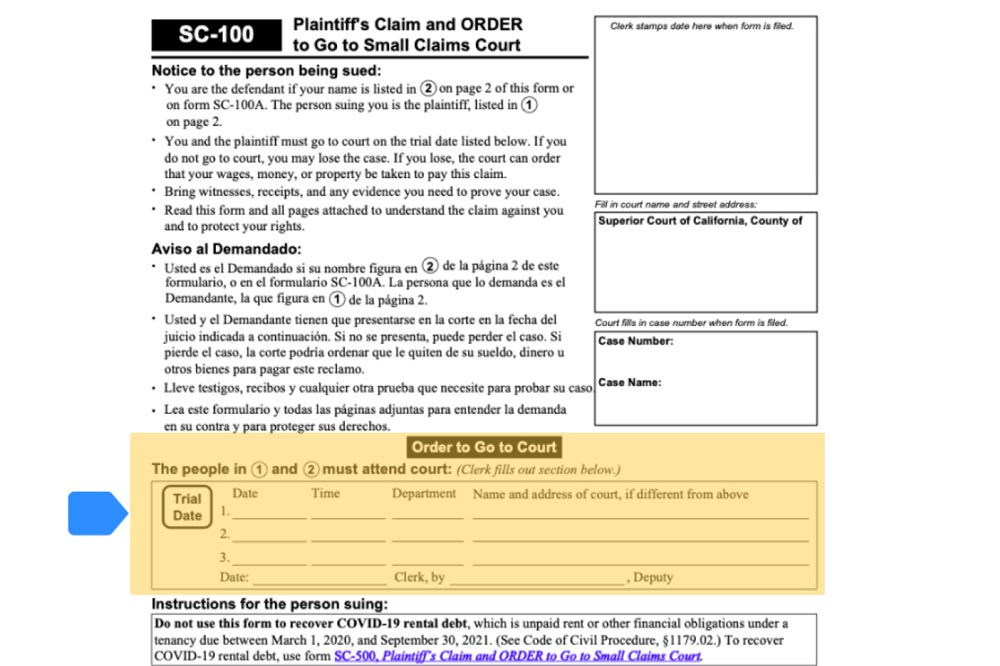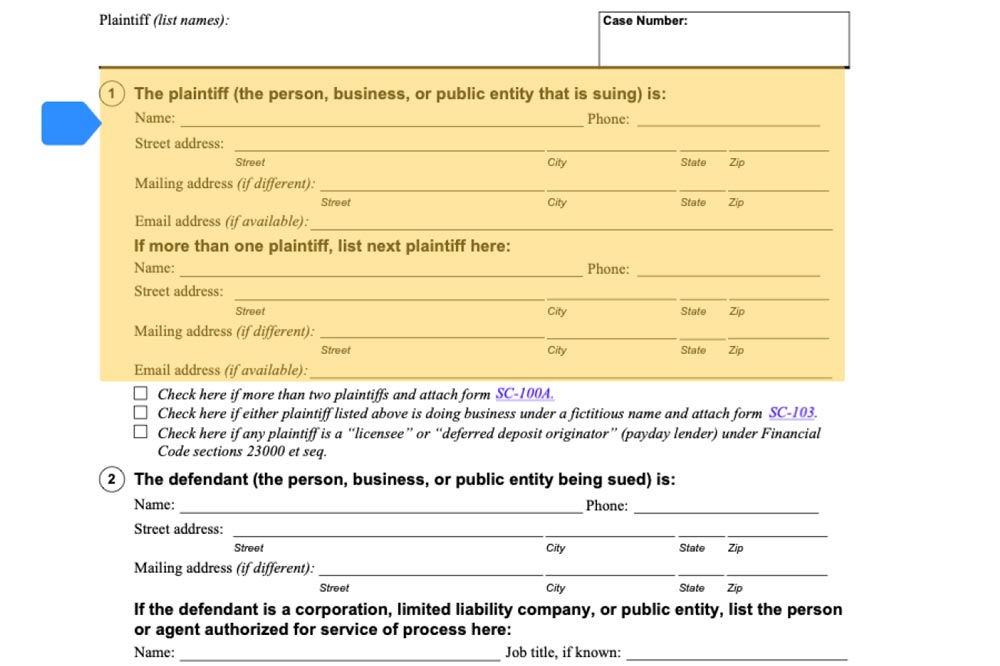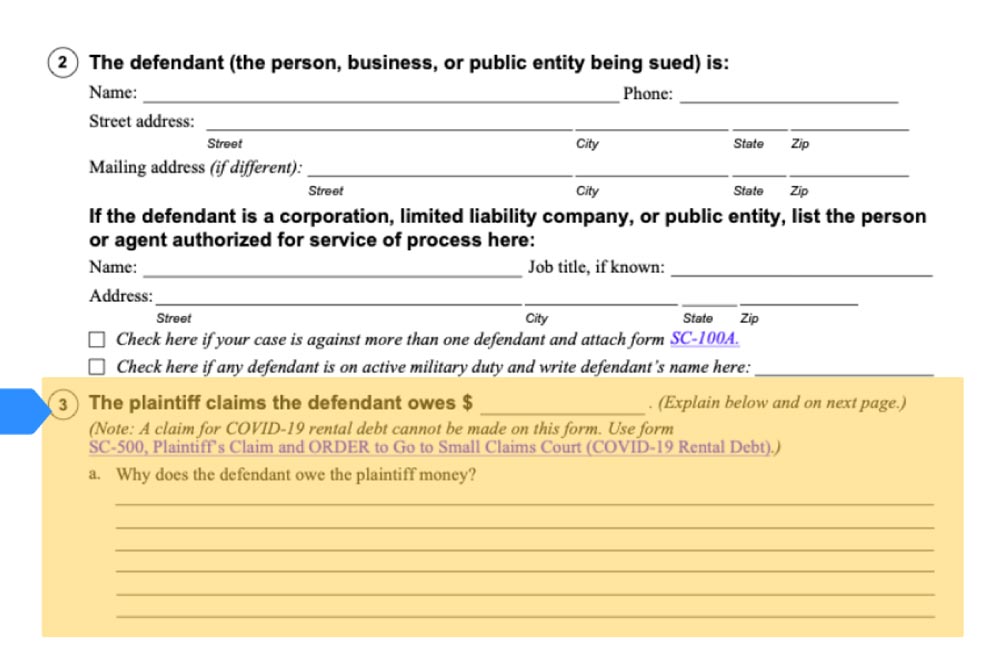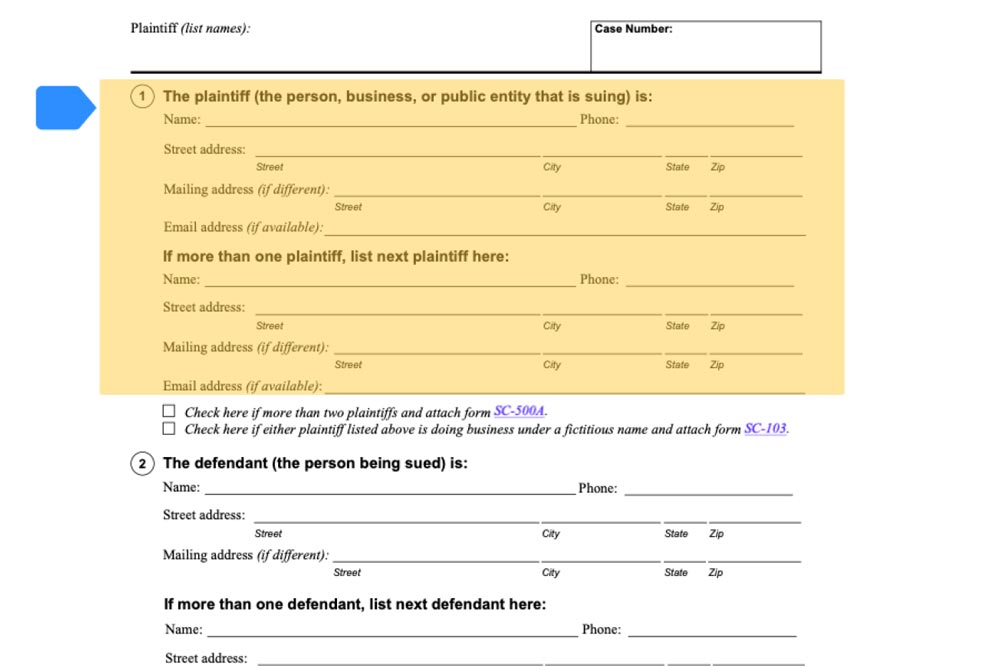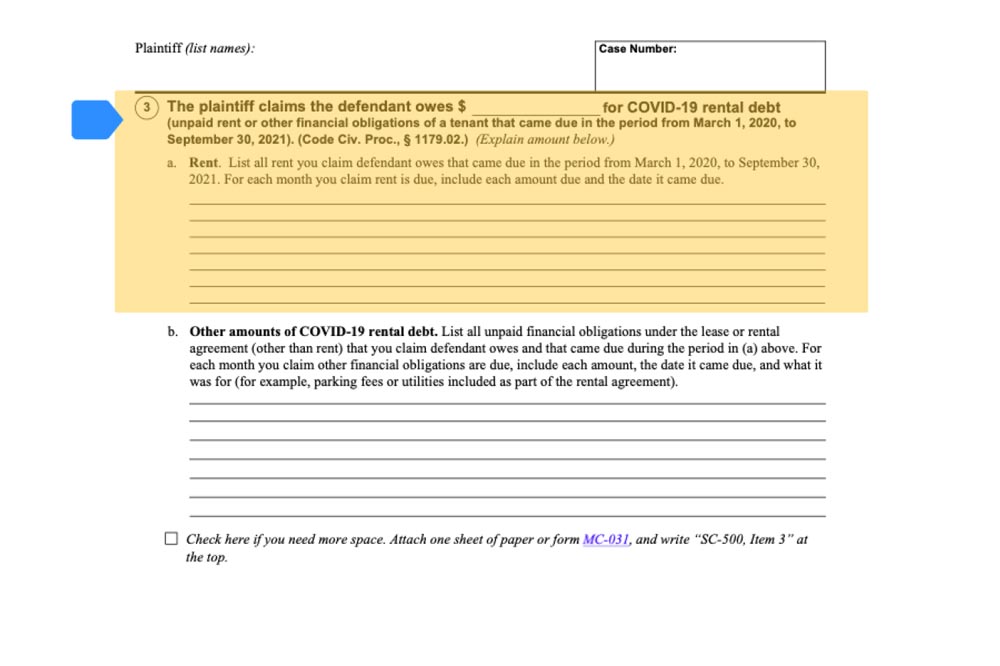Small Claims Basics
Small claims court allows you to sue a person, business, or government agency that you think owes you money. Generally, you can only sue for up to $10,000 in small claims court (or up to $5,000 if you’re a business). You can ask a lawyer for advice before you go to court, but you can’t have one with you in court.
Small Claims Is a Cheaper and Faster Process
The costs. The filing fee for a small claims case is between $30-$100. If you can’t afford the fee, you can ask the court for a fee waiver.
How long to go to court. Once you file papers to start a case, you typically have a court date (trial) in about 1-2 months.
There Are Some Limits on Small Claims
- You can’t have a lawyer represent you.
- You have to collect the money if you win your case. The court does not do it for you.
- If you started the case, you can’t appeal if you lose your case. The judge’s decision is final. You can appeal if you are sued, or the other side sues you back, and you lose.
If small claims court limits don’t work for you, you may want to think about opening a case in civil court. That process is much more challenging and expensive, though, especially if you decide to file on your own without an attorney.
Forms
All California courts use the same basic set of forms found on the court’s website. However, some courts have local forms, filers need to fill out as well. For any special, local forms, filers will want to contact the specific court’s clerk or check the court’s website.
You may find many of the required forms at https://www.courts.ca.gov/1017.htm.
Initiate a Small Claims Case
The small claims process is an easier way to take someone to court. It’s for when you think the other side owes you less than $10,000 (or $5,000 if you’re suing as a business).
You must fill out a Plaintiff’s Claim and Order to Go to Small Claims Court (form SC-100).
This form tells the court who you are, who you’re suing, why, how much you are suing for, and why you’re suing in this county.
On this form, you will:
- List the proper legal name of the person or business you’re suing (called the Defendant). If you don’t, you might not be able to collect the money if you win. Learn how to name the Defendant.
- Write the court address where you’ll file the forms. And, check the box with a legal reason you can sue in that county. Find out where you can sue and get the court address.
Find Out if There Are Any Local Forms to Complete
Some courts have additional local forms they require you to use.
Contact your court clerk’s office, check your court’s website, or talk to the Small Claims Advisor to ask if they have any local forms you need to use.
Fill Out and Attach Other Forms
In some cases, you need to fill out and attach other forms to form SC-100.
If you need more space to add other Plaintiffs or are suing more Defendants, also fill out:
- Other Plaintiffs or Defendants (Attachment to Plaintiff’s Claim and ORDER to Go to Small Claims Court) (form SC-100A)
This form gives you more space to provide the information of other people or businesses.
If you are a business with a Fictitious Business Name, also fill out:
- Fictitious Business Name (Small Claims) (form SC-103)
This form tells the court and other side about your business Fictitious Business Name.
If you are suing about an attorney fee dispute that went to arbitration, also fill out:
- Attorney Fee Dispute (After Arbitration) (Attachment to Plaintiff’s Claim and ORDER to Go to Small Claims Court) (form SC-101)
This tells the court that the case is about an attorney fee dispute for less than $5,000 and that you went to arbitration.
Make copies of your forms
Make 1 copy for you and 1 copy for each person, business, or agency you’re suing. So you’ll have the original and at least 2 copies.
Initiate a Small Claims COVID-19 Rental Debt Case
Defendants in a Small Claims Case
If you received a Plaintiff’s Claim and ORDER to Go to Small Claims Court (form SC-100), it means someone is suing you in small claims court. This form tells you you trial date and time, who is suing you, and what the other side is asking the judge to decide. The court sets a date to hear from both sides (a trial) before it makes a decision.
Trial Date and Time
The date, time, and location are on the first page.
If you can’t go to court on the day and time listed, you can ask the court to change the court date. Fill out and file Request to Postpone Trial (form SC-150). There’s a $10.00 fee to change the court date.
Who Is Suing You
The name of the person, business, or government agency that’s suing you on page 2.
What the Other Side Is Asking the Judge to Decide
How much money the other side is asking for, and why, are written on page 2 and on any attachments.
What You Can Do
Come to an Agreement With the Other Side
If you can work with the other side (and there is no restraining order involved) you may be able to come to an agreement on your own without going to court.
Go to Your Court Date
If you disagree with all or some of what the other side is asking for or saying, you can go to the court date and give your side of the story.
Sue the Other Side Back and Go to the Court Date
If you think they owe you money, you can fill out, file, and serve a Defendant’s Claim and ORDER to Go to Small Claims Court (form SC-120). Then you can go to the court date and give your side of the story. If you can’t afford the filing fee, you can ask for a fee waiver.
Choose to Not Respond
If you were given the forms correctly (served) and don’t go to the court date, the judge will decide without your input. You will probably lose the case and owe the other side money.
Defendants in a Small Claims COVID-19 Rental Debt Case
COVID-19 rental debt is rent and other payments required under the rental agreement, like utilities or parking fees, that came due between March 1, 2020 and September 30, 2021.
If you received a Plaintiff’s Claim and ORDER to Go to Small Claims Court (COVID-19 Rental Debt) (form SC-500), your landlord is suing you for COVID-19 rental debt in small claims court. This form tells you the trial date and time, who’s suing you, and how much money is your landlord asking for. The court set a date to hear from you and your landlord (a trial) before it makes a decision.
Trial Date and Time
The date, time, and location are on the first page.
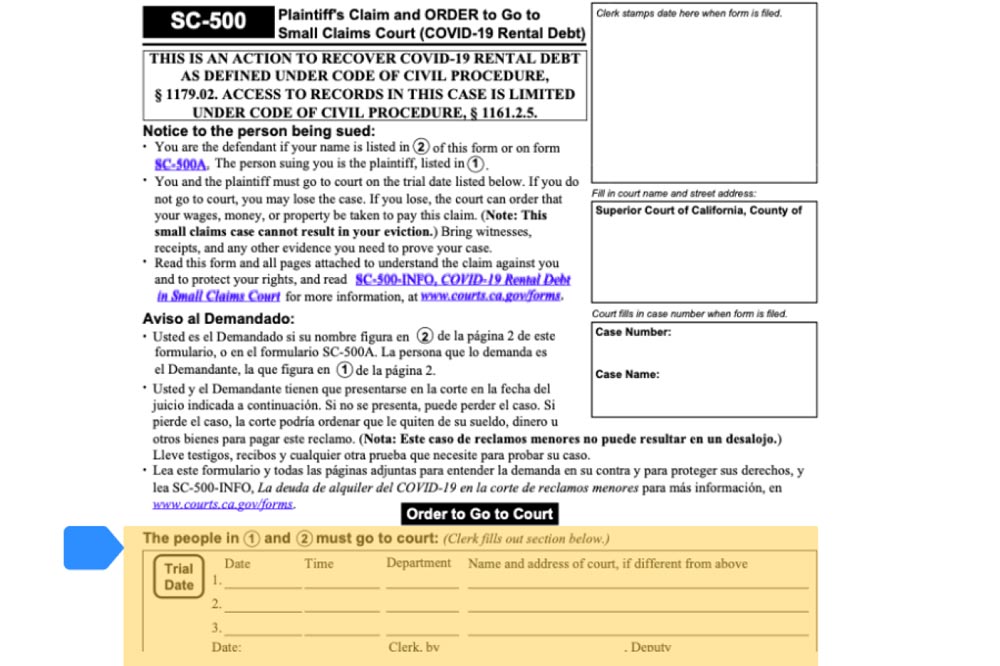
If you can’t go to court on the day and time listed, you can ask the court to change the court date. Fill out and file Request to Postpone Trial (form SC-150). There’s a $10.00 fee to change the court date.
Who’s Suing You
Your landlord’s name is listed on page 2. If your landlord is a business, then an employee, like the property manager, may be the person who shows up in court.
How Much Money Is Your Landlord Asking For?
Item 3 lists the amount of COVID-19 rental debt your landlord is suing you for. Item 4 lists what your landlord has already been paid.
What You Can Do
Agree With the Other Side
If you can work with your landlord (and there is no restraining order involved), you may be able to agree on your own without going to court.
Go to Your Court Date
If you disagree with all or some of what your landlord is saying or you have some other defense, you can go to the court date and give your side of the story. For example, you can explain if the amount your landlord is asking for is wrong. There isn’t a form to file to respond. You can just show up on the court date. You can ask a lawyer for advice before your court date, but you can’t have a lawyer in court (nor can your landlord).
Sue the Other Side Back and Go to the Court Date
If you think your landlord owes you money (for example, they owe you money from your security deposit), you can fill out, file, and serve a Defendant’s Claim and ORDER to Go to Small Claims Court (form SC-120). Then you can go to the court date and give your side of the story. If you can’t afford the filing fee, you can ask for a fee waiver.
Choose Not to Show Up in Court
If you were given the forms (served) correctly and don’t go to the court date, the judge will decide without your input. You’ll probably lose the case and owe your landlord money.
Source: https://selfhelp.courts.ca.gov/small-claims-california

